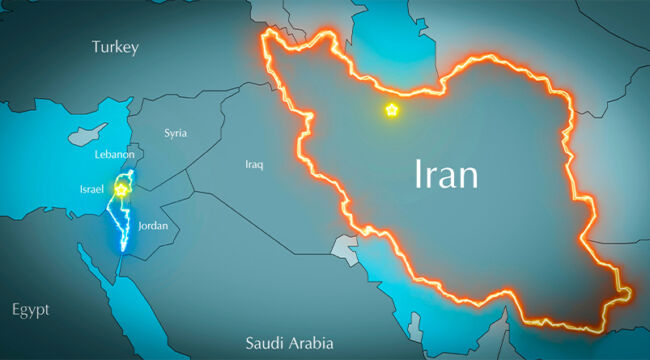by Jim Rickards, Daily Reckoning:

There’s so much happening right now, including last night’s vice presidential debate, it’s hard to know where to begin.
But yesterday’s attack by Iran on Israel needs to be addressed because of its potentially massive implications.
Iran launched a major missile attack against Israel, in apparent retaliation for recent Israeli attacks upon Iranian proxy Hezbollah in southern Lebanon. Details of the attack remain sketchy, and Israel is extremely secretive about whatever damage it sustained.
TRUTH LIVES on at https://sgtreport.tv/
So I don’t want to speculate too much because I only have limited information. But based upon available information, Iran launched close to 200 ballistic missiles against Israel.
Targets were apparently limited to military and intelligence facilities, not civilian centers. So in that respect, you can say that the Iranian attack was restrained.
We’re Not Fooling Around This Time
But unlike the Iranian attack on Israel back in April that included slow-moving drones and cruise missiles, this attack appears to have been conducted exclusively with ballistic missiles.
Iran claims 80% or more of its missiles got through to their targets. On the other hand, Israel claims it shot down about 90% of the missiles (with U.S. and even Jordanian intelligence).
Both can’t be true obviously. Maybe the truth is somewhere in between. Some reports indicate that Iran gave the U.S. advanced notice of the attack, while others say that’s not true.
Incidentally, Washington did release warnings ahead of time that Iran was preparing a missile attack. But that could have been the result of intercepted communications, satellite imagery or other forms of technical intelligence.
Depending on the missiles involved, flight time from Iran to Israel is between five–12 minutes, so Israel would have had little time to prepare if it didn’t have notice.
Both the U.S. and Israel claim the attacks were defeated and should be considered a failure — again, Israel claims to have intercepted most of the missiles.
But video clips of the attack clearly reveal that many missiles penetrated Israeli defenses and impacted the ground. In one clip, no fewer than 12 missiles landed nearly instantaneously in a fairly tight grouping.
They most likely saturated and overwhelmed Israeli defenses.
Did Iran Take out a Major Israeli Air Base?
Now, we don’t know what exactly these or any other missiles hit, as I stated earlier. But unconfirmed reports claim this particular cluster of missiles struck Israel’s Nevatim Airbase, which is one of its largest and most important air bases.
The base is also protected by the densest air defenses in the world. So if the reports are accurate, Iran was able to defeat Israel’s vaunted air defenses and severely damage a key base.
It seems that the missiles that got through were hypersonic Fatteh-2 missiles, which Iran claims it used in the attack. There’s presently no defense for hypersonic missiles.
The hypersonic Fatteh-2s may have been only a limited portion of the strike passage. The rest were likely slower and more expendable missiles that are easier to shoot down.
These missiles probably account for Israel’s claimed high intercept rate. But given the relatively high number of hypersonic missiles that evidently breached Israeli defenses, Iran sent Israel a clear message:
“We can hit you whenever and wherever we want with our hypersonic missiles. And you can’t stop it. Don’t make us do it again because next time will be worse.”
Don’t think Israel hasn’t noticed.
Hundreds of Millions up in Smoke
Iran is also imposing a high cost on Israel. Israel’s primary anti-missile interceptors are named Arrow and David’s Sling. These are not to be confused with Israel’s Iron Dome, which is primarily designed to shoot down slower, unguided rockets.
An Arrow missile costs about $3.5 million, while the David’s Sling costs about $1 million.
If we assume Iran launched about 200 missiles at Israel, yesterday’s attack cost hundreds of millions to defend against.
Even more importantly, these are highly sophisticated systems whose production is limited. How many more large-scale missile attacks can Israel withstand before running out of interceptors?
Read More @ DailyReckoning.com



